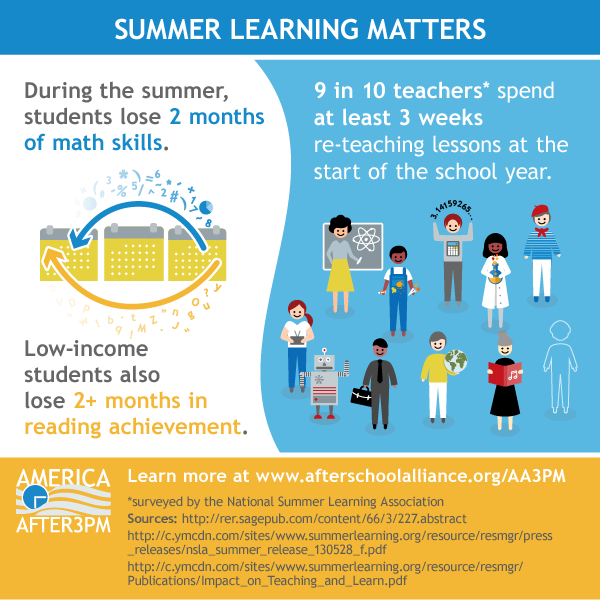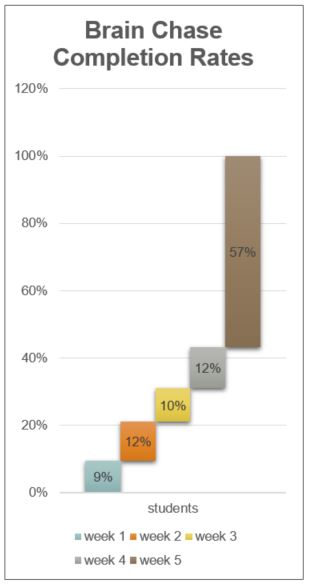
Brain Chase Boosts Student Achievement
Out-of-School Learning Loss
Startling research shows that when school is out, kids lose more ground academically than one might expect. In fact, summers are arguably one of the least recognized yet most important causal factors for underachievement in schools.
This 2011 RAND study found that by the end of summer, students perform, on average, one month behind where they left off in the spring. Sadly, this loss disproportionately affects low-income students. Most disturbing is that the loss is cumulative; low-income students fall farther behind each year as a result of summer break.
Brain Chase is designed not only to fight summer learning loss, but to boost the effectiveness of out-of-school time year-round. Scroll down to see what Brain Chase electives can do for your students.
The Effectiveness of Khan Academy Math
This 2014 SRI Education study revealed the following:
- Students who spent more time on Khan Academy and successfully completed problem sets experienced more positive than expected outcomes in terms of math test scores, reduced math anxiety, and had higher confidence in their ability to do math.
- Students who complete 60% of their grade-level math on Khan Academy experience 1.8 times their expected growth on the NWEA MAP assessment.
- Student use of Khan Academy correlates with score gains on standardized achievement tests.
- 71% of students reported that they enjoyed using Khan Academy, and 32% of students agreed they liked math more since they started using Khan Academy.
- 87% of students using Khan Academy were more engaged with math than were their counterparts.
- 45% of student respondents said that with Khan Academy they were able to learn new things on their own, without the help of a teacher.
- 86% of teachers would recommend Khan Academy to other teachers, and 89% plan to use it with their students in the coming school year.
- 85% of teachers reported that Khan Academy had positiviely affected their students’ learning and undrestanding of hte material overall.
- 91% of teachers indicated that using Khan Academy increased their ability to provide students with opportunitites to practice new concepts and skills they had recently learned in class.
The Power of Out-of-School Reading
This 2010 School Library Journal study demonstrated that:
- On average, students who participate in summer reading programs are 52 Lexile points ahead of their peers who do not.
- Children who read at least six books during the summer maintained or improved their reading skills, while kids who didn’t read any saw their skills slip by as much as an entire grade level.
- Summer reading—whether measured by the number of books read, the time spent reading, or even by how often kids used the library—systematically increased students’ vocabulary test scores.
- Students who didn’t read during the summer lagged two years behind their book-reading peers.
- Third-grade students who participated in summer reading programs scored higher on reading tests at the beginning of fourth grade and didn’t experience summer learning loss.
Brain Chase: The Quantitative Results
Khan Academy works. Reading programs work. Likewise, Typing Club, Rosetta Stone, Code Combat, YogaMeDo, and other programs work. But only if students are actually logging in and doing the work!
That’s where Brain Chase shines. During a typical 5-week summer program, the average Brain Chase participant logs:
- 49,000 Khan Academy Engergy Points, or the equivalent of over 4 hrs of personalized, self-driven math work.
- 5.3 hours of self-paced reading time, whether offline or via Google Books.
- 3.8 hours of foreign language study in one of 30 different languages offered in Rosetta Stone.
- 4.2 written journal submissions, each reviewed by a credentialed writing teacher.
- Several hours piecing together clues and studying world geography to register guesses.
- And much more, depending upon electives chosen…
Brain Chase: The Qualitative Results
Don’t take our word for it. Listen to what Teachers, Parents and Students are saying about the Brain Chase program:
- 94% of parents surveyed indicated that Brain Chase helped their students “stay sharp” over the summer. Read the parent reviews here.
- 94% of students surveyed agreed that Brain Chase helped them “stay sharp” over the summer. Read more student reviews here.
- Click here for teacher reviews.
- Click here to read our reviews on Facebook.
It’s Educational… But How Educational Is It?
We know Brain Chase helps students. Exactly how much? There are several reasons why that data is difficult to pin down. Among them:
- Students can choose different electives. A student who chooses Rosetta Stone, Engineering, and Yoga will progress differently than a student who chooses Reading, Writing, and Math.
- Students can learn they want, and move at their own pace. One fourth-grader might need to review basic subtraction, and another might be ready to try calculus. Which one learned more fourth-grade math? Neither – but both benefit from the freedom that online learning offers.
- We don’t test our students. Sure, we could provide pre-tests and post-tests. But not only does that take away some of the magic of learning, but we think it would also drive us to “teach to the test,” shoehorning students into certain electives, and certain lessons within those electives. That’s just not Brain Chase.
- Compared to… nothing? We know that Brain Chase participants log over four hours of personalized Khan Academy math each summer, and we’d love to draw comparisons to non-participants. The problem? We can’t find a single statistic indicating that other students do any math at all during the summer! There’s probably a reason for this – the same reason which drove us to create Brain Chase.
- Is there a way to test 21st Century Skills? One comment we hear consistently is that students (and families) learn far more from the Brain Chase treasure hunts than they do from the different electives. They learn grit, creative problem solving, world history and geography, codebreaking, out-of-the-box thinking, and many other skills that are hard to put numbers behind.
The Bottom Line
We’ve worked hard to build the best summer and after-school program in the world. We’ve taken the best research from Harvard grads and Blended Learning industry experts and worked with our screenwriter friends at Marvel to wrap it in an irresistible game and storyline. We’ve studied the completion rates, poured through survey results, visited classrooms, and met with individual participants in their homes to hear first-hand about their families’ experiences.
As much as we’ve loved studying Brain Chase on the aggregate, we’ve found that the real magic lies in what it can do for individual students. Take Laura, for instance. Watch her story below, and you’ll understand why we do what we do – and why it can be hard to put a number on success.
Join us, and see what Brain Chase can do for your students.
Have questions? Please email us at info@brainchase.com.


